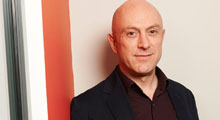
Phil Clarke, Channel 4’s Head of Comedy and one of the most powerful people in comedy, gave me his tips on how to make it and explained why he supports the National Film and Television School’s Comedy Writing and Producing Diploma.
The 18-month, part-time Diploma is run by the NFTS in partnership with Channel 4 and is led by renowned comedy writer and producer, Bill Dare.
Students benefit from tuition from industry professionals including Phil Clarke who comes in twice a year – once at the beginning where he covers the practicality of being a writer and how the industry works and once at the end where the students get to pitch their ideas to him.
Phil tells the students that ‘the best way to pitch is not to pitch formally, but rather try and engage in an ongoing informal conversation with producers and commissioners, focusing in on what they are looking for, and allowing yourself to be guided at an early stage in the development process. And most importantly, to keep going despite adversity and rejection! Learning to deal with rejection is an essential tool for survival in the business. Rejection is something that writers, producers and even commissioners have to deal with on a regular basis.’
I asked Phil if it’s possible to teach someone to be funny: ‘Many people ask me for advice on how to get into comedy and I always say that if you are asking, it’s probably not for you as most comedy writers just have a burning desire to do it. You can however technically learn the craft and tutors can advise how to make a script funnier or more dramatic. The course gives you a good grounding on both the practical and the creative side with all the tuition coming from professionals who have been there and done it and know what works for different mediums. You couldn’t have someone better than Bill to lead the course as he’s a successful writer and producer who has also navigated the shark infested waters of TV and radio! Students learn what is in fashion creatively and how to craft their work. On a practical level, they learn ways to pitch and the skills to take notes from producers without compromising their original idea.’
‘We discuss how scripts need to be targeted towards the channel as well. For Channel 4, comedies need to be edgy, awkward and dangerous so we might advise the writer to stay with a scene and explore its awkwardness. We find that a lot of young writers want to write for Channel 4 – in fact we are inundated with scripts - but there is actually a real need for scripts with a more mainstream appeal that would be suited to primetime slots on other terrestrial broadcasters. Some writers don’t realise they have a mainstream voice and we would encourage them to explore that and keep comedy vibrant and productive for the good of the industry overall.’
On whether comedy is in a good state, Phil is extremely positive but admits that the industry is split down the middle with some saying it’s in rude health and the others saying it’s in a bad state. ‘The truth is that it’s always been like that; when you really look at the supposed golden era of the 1970s you realise that there were a lot of shows that people have forgotten about. There are always great shows in any era; everyone is a comedy expert and has their own opinions on what’s good. In fact, there are more comedy shows being made than ever and bigger audiences overall thanks to the proliferation of channels. And that means more opportunities for writers.’
I asked Phil why he thought the course attracted so many female comedy writers; for example, one student, Juliette Burton and one alumna Cassie Atkinson are performing at this year’s Edinburgh Fringe and another student, Rosie Jones has just won the London Final of the Funny Women Awards. ‘When I first started in comedy, there were hardly any women but now there are lots. At Channel 4, we don’t operate any positive discrimination policy, we simply look at the script and then see who wrote it. I think something really interesting is going on and the rise of women in comedy is a reality. Women are allowed to be funny now and have found their funny voice and we are keen to encourage that.’
I asked Phil whether a stand-up comedian could be a writer and vice versa. ‘There are many brilliant comedians who can only write for themselves. Some can do both but they are rare animals. It’s a great idea to experience live performance as you get to build an understanding of what the performer has to go through and how to work the audience.’
I finished by asking Phil if he enjoyed teaching on the course. ‘I love meeting the students; they are young and have a drive and a real burning passion to write. As a hoary old professional, it’s great to feed off their energy and spark! It helps you remember how exciting it was when you started and that’s a real gift.’
Phil’s recommended Channel 4 comedy shows:
· Flowers
· Catastrophe
· The Windsors
· Man Down
If you are interested in applying for the NFTS Comedy Writing and Producing Diploma, applications are open until September 8th 2016.






















